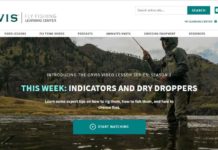Rubber boots were a daily wear item back when I owned a farm and have been a vital piece of equipment for a lot of my hunting, fishing, and exploring. I’ve always looked for three standout qualities from them: durability, comfort, and 100-percent waterproofness. But living in the South, as I do, it would also be nice to have an extra feature built into your boots — snakebite protection.
Despite the prevalence of so many snakes on my stomping grounds (I don’t know that I’ve ever been to a creek from April through October and NOT seen a cottonmouth, usually several) and the overblown phobia of snakes, the odds of being bitten by a venomous snake are extremely low.
Snakes aren’t mean or evil. Snakes don’t chase people. Snakes are relatively small, legless animals that aren’t very fast. They bite only as a last resort, and they don’t want to. They don’t want to risk injury or waste energy, and they certainly don’t want to waste that precious venom — the only means of defense and procuring food that a venomous snake owns. Snakes never bite people with malice. Snakes bite because they’re terrified for their lives, and you have to nearly make physical contact to elicit a strike. I know this because I’ve been within striking distance of countless and, so far (knock on wood) no bites. In my more adventurous, and some would say stupid days, I even caught a couple of venomous snakes with nothing more than my bare hands and a hickory stick and neither reptile even took a swing at me.
But sometimes shit happens. Sometimes people put their foot in the wrong place at the wrong time on the wrong snake and, suddenly, at the worst they’re facing possible death (though, extremely unlikely) or major tissue damage (fairly likely). And at best, a whole bunch of pain and agony paired with a long road to recovery.
If you’re wearing footwear designed to block those fangs, your odds of having to endure any of those outcomes goes down quite a bit. If you can find a pair of rubber boots that offer this protection along with those other three must-have features — durability, comfort, and 100-percent waterproofness — well, that’s a helluva boot.
Muck Boot Company has a new model that could check all of the boxes. It’s based on their popular Wetland model and is called the Wetland Pro Snake. That Muck is an icon in the outdoor footwear industry after only 20 years of existence speaks volumes about the quality of its products. The brand is strong on rural and blue-collar appeal, and the boots themselves have a “let’s get this job done” look about them. There’s not a whiff of pretentiousness in any of the models and they’re all designed for toughness. Legions of farmers, hunters, anglers, weekend gardeners, and anyone else who works or plays in muddy and wet — mucky — conditions swear by Muck boots.
What Works
Comfort
Despite their Spartan looks, a lot of thought went into civilizing the Muck Wetland Pro Snake (WPS). Tops on the list are the 5mm Neoprene bootie and Muck’s 3D Airmesh lining. The Neoprene bootie allows the boot to flex with your movements even with its extra rubber sheathing that Muck claims is “certified against snake bite”. There is a bit more rigidity because of this extra rubber, but the boot is far from stiff. The 3D Airmesh lining does an admirable job, but the WPS is warm. Muck says the temperature range for the WPS is sub-freezing to 65F. It’s winter as I write this with highs mostly in the 40F-50F scale, and my feet have been warm and cozy with minimal perspiration on every hike. There is some concern that in hot weather —when snakes are most active — my feet might overheat, but I’m not convinced that that will be the case. The boots do seem to breathe, which is a tough trick for a rubber boot.
Adding to the creature comforts is an EVA midsole for your stepping pleasure and bioDEWIX antimicrobial footbed insert topcover with NZYM for odor control and moisture management. That is indeed a mouthful of trademarked verbiage. But they’re added to the package because of their no-frills practicality. Nobody likes to slip their feet into a pair of dank and stanky boots. Or maybe you do, but I don’t.
Also factoring into comfort, putting the boots on and taking them off. No issues at all here. The WSPs feature pull tabs and small heel kicks that make both of these actions simple, contortion-free exercises.
Photo: Johnny Carrol Sain
Durability
I don’t have high mileage on the WSP boots yet, and the snakes are mired in lethargy awaiting the warm days of spring, but the briars and barbed wire (my superpower is the ability to find a random string of barbed wire on even the most remote of public land) are ever-present. So far, the boots barely show a scratch. There’s a burly feel to the WSPs I suspect will carry over into the long-term ruggedness that is a Muck hallmark.
Traction
Excellent marks for sure-footedness across rocks, creeks, in the woods, and even in the mud. The lugs are advertised as self-cleaning and, in my experience, they are.
Waterproofness
The 100-percent rubber outer covering on the WSP translates to what should be 100-percent waterproofing. The usual weak links in the quest for submersible footwear are the seams, but every seam on the WSP looks to be welded tight. Outside of a gash, rip, or hole in the boots, your feet will most assuredly stay dry even while standing in water.
What Doesn’t
Weight
Each of my size 11 boots weighs three pounds and three ounces. That’s nearly a pound more than my leather and nylon snake boot and more than a pound heavier than each of another pair of “rubber-style” boots I own. Granted, the WSP is a marriage of both of these boot options, essentially combining the best qualities of each to make a do-it-all boot. Also, realize that these aren’t hiking boots. They’re not designed for traipsing for miles over yonder hill and dale, though, I do plan to give that a got this spring turkey season and for some long hauls to a secret creek well off the beaten path. I don’t know that there is room to trim ounces without sacrificing the attributes that make the WSP what it is, but them are some heavy boots.
Tight uppers
I’ve got one niggling gripe about the design of the upper boot. It needs some adjustability. The opening is narrow, which is fine for the all-neoprene uppers of the WSP’s brother-in-design, the Wetland. But the rubber-coated uppers of the WSP don’t flex as much. This could be a problem for those with big calves and, though I don’t have bulging calves, it was a problem for me when trying to tuck my insulated overall legs into the boots. An adjustable gusset would be a welcome addition.
Price
The Muck Wetland Pro Snake retails for $140-$180, which is right in line with other quality rubber-style boots and snake boots.
Final Word
Despite the weight and yet-to-be-determined comfort in warm weather, I like the Muck Wetland Pro Snake boots and think they’ll play a significant role in my outdoor exploits for several years. There’s a confidence in my stride when I wear them, an assurance that no matter where the trail leads or what I run into, the WSPs will get my feet and shins through it dry, unscathed, and in cozy comfort.
BUY THE MUCK WETLAND PRO SNAKE BOOTS
Credit: Source link































